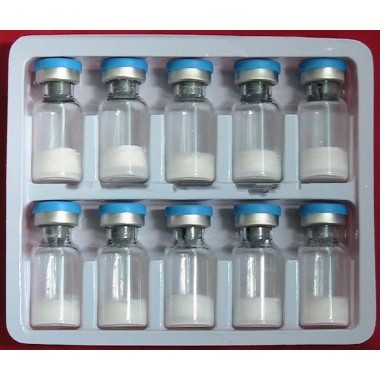2mg/Vial Bodybuilding Human Growth Pentadecapeptide Bpc 157 (137525-51-0)
- FOB Price:Get Latest Price >
- Min.Order:1 Vial(s)
- Payment Terms:T/T , Money Gram
- Favorite
Product Information
- Pharmacopeia:CP
- Shelf Life:18 months
- Storage:Sealed
Description
Pentadecapeptide BPC 157 (2mg)
Pentadecapeptide Bpc 157(2mg/vial) For Repairing Musscle Tissue
Pentadecapeptide Bpc 157 CAS: 137525-51-0
Pentadecapeptide Bpc 157 SYNONYMS: Booly protection compound 15, Pentadecapeptide,
Pentadecapeptide Bpc 157 SEQUENCE: Gly-Glu-Pro-Pro-Pro-Gly- Lys-Pro-Ala-Asp-Asp-Ala-Gly-Leu-Val
Pentadecapeptide Bpc 157 MF: C62H98N16O22
Pentadecapeptide Bpc 157 MW: 1419.53552
Pentadecapeptide Bpc 157 PURITY :≥99% (HPLC)
PHYSICAL STATE: Lyophilized Powder
SOLUBILITY: Soluble in water or 1% acetic acid
STORAGE: Lyophilized peptides although stable at room temperature for 3 months, should be stored desiccated below -18°C. Upon reconstitution of the peptide it should be stored at 4°C between 2-21 days and for future use below -18°C.
Pentadecapeptide BPC 157, composed of 15 amino acids, is a partial sequence of body protection compound (BPC) that is discovered in and isolated from human gastric juice. Experimentally it has been demonstrated to accelerate the healing of many different wounds, including transected rat Achilles tendon. This study was designed to investigate the potential mechanism of BPC 157 to enhance healing of injured tendon. The outgrowth of tendon fibroblasts from tendon explants cultured with or without BPC 157 was examined. Results showed that BPC 157 significantly accelerated the outgrowth of tendon explants. Cell proliferation of cultured tendon fibroblasts derived from rat Achilles tendon was not directly affected by BPC 157 as evaluated by MTT assay. However, the survival of BPC 157-treated cells was significantly increased under the H2O2 stress. BPC 157 markedly increased the in vitro migration of tendon fibroblasts in a dose-dependent manner as revealed by transwell filter migration assay. BPC 157 also dose dependently accelerated the spreading of tendon fibroblasts on culture dishes. The F-actin formation as detected by FITC-phalloidin staining was induced in BPC 157-treated fibroblasts. The protein expression and activation of FAK and paxillin were determined by Western blot analysis, and the phosphorylation levels of both FAK and paxillin were dose dependently increased by BPC 157 while the total amounts of protein was unaltered. In conclusion, BPC 157 promotes the ex vivo outgrowth of tendon fibroblasts from tendon explants, cell survival under stress, and the in vitro migration of tendon fibroblasts, which is likely mediated by the activation of the FAK-paxillin pathway.
Business Type:Trader
Country/Region:China
Ddu Verified
HOT Rank



